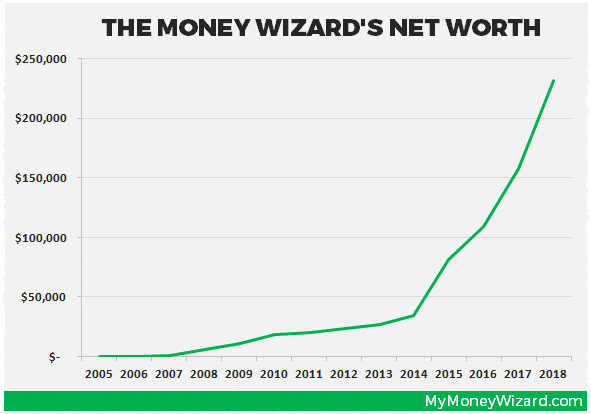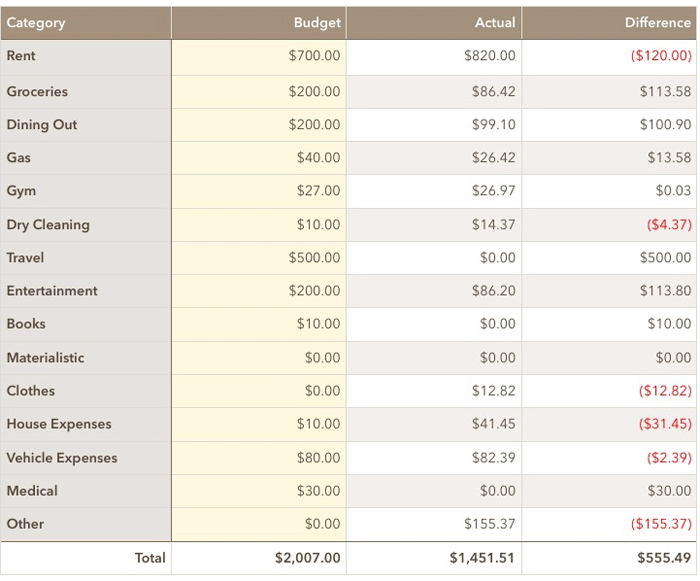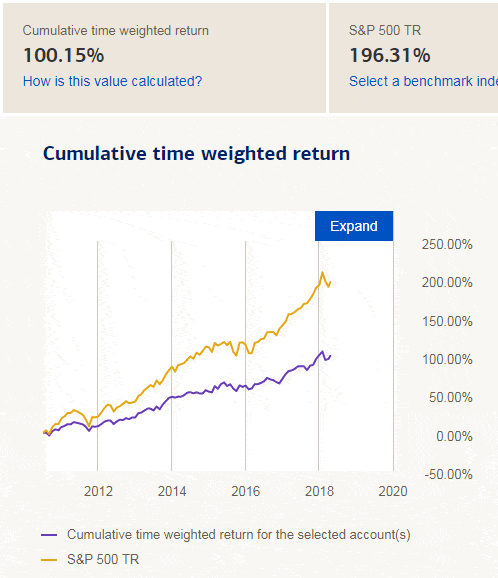 Today, I want to introduce you to Sean. He is a financial analyst by day and money blogger by night. He saved over $200,000 by age 27 and plans to retire in less than 10 years. Enjoy!
Today, I want to introduce you to Sean. He is a financial analyst by day and money blogger by night. He saved over $200,000 by age 27 and plans to retire in less than 10 years. Enjoy!
No, that headline never gets any less surreal the more I read it.
And no, I wasn’t a lucky lottery winner or a privileged trust fund beneficiary. (Unfortunately)
Instead, I got my money building start at the oh-so-glamorous position of digging ditches in the scorching Texas summers. When I eventually saved up a whopping $500, I opened my first savings account. From there, I took a few years working up the courage to invest in the stock market, and then I held my breath in terror, hoping I didn’t lose everything during the recession.
Related content:
- How This Couple Retired In Their 30s and Now Travel Around The World: An Interview With Go Curry Cracker
- How My Wife and I Paid Off $62,000 in Debt in 7 Months
- How We Paid Off Almost $10,000 in 10 Weeks
- How I Paid Off $40,000 In Student Loans in 7 Months
- How Much Money Should I Save Each Month?
I then strapped in for a wild ride past all sorts of neat milestones – $25,000 by age 23 and $100,000 by age 25, when I started my blog. The extra accountability of publicly sharing my net worth every month must have provided motivation, because just two years later I’ve now saved over $200,000.
In true OCD-money-blogger fashion, I’ve kept this chart outlining my progress:

But that’s just the story of the numbers. Behind all those numbers are some surprisingly simple steps anyone can implement to kick their savings into overdrive.
1. I realized the power of compounding.
In high school, my math teacher sat the class down and asked a simple question. Would you rather have $1,000,000 right now, or a penny that doubled every day for a month?
If you chose the million bucks, prepare yourself for the lottery winner’s remorse. While I’d certainty take a million without complaining, that tiny little doubling penny would have left you with, wait for it… $5.4 million at the end of the month.
(And yes, the majority of the class chose the million dollars.)
Here’s another counterintuitive example. Consider two investors who both want to become millionaires by age 60. They each invest in the stock market and earn 7% each year.
To become a millionaire, the first investor needs to invest $10,000 a year from age 24-40. Then, she’s free to stop investing entirely, coasting to the million-dollar finish line at age 60.
Now imagine the second investor procrastinates a bit, and he doesn’t start investing until age 40. To retire with the same amount of money, he’ll have to invest over $26,000 a year. AND make those larger investments for 4 more years than the first investor!
I’ll admit, this is hard to conceptualize.†There’s no shame. The human brain isn’t really hard-wired to understand exponential returns.
Compounding is confusing. It’s hazy. It’s really-freakin-hard to imagine a penny doubling 30 times in a row.
What’s this all mean, anyway?
It means the best time to start investing is undoubtedly, unquestionably, RIGHT NOW.
I was lucky to have this epiphany early, and I started investing in the stock market in my late teens. Sure, I wasnít investing much back then, but I was investing something.
And when you invest even the smallest amount, your dollars get the power of time (and the power of compounding) on their side.
2. I got a degree that pays.
I graduated college with a degree in Economics and Finance, which happens to be one of the 11 highest paying college degrees.
Sure, Iíd love to say that I chose the degrees because they were my true passions in life, and I was just living out my destiny. (And maybe thatís party true, since I do blog about money in my free time.)
But whatís much more accurate, is that I strategically chose the degrees because I thought they represented by best chance at making bank.
I researched starting salaries. I reviewed real life job postings on glassdoor.com, monster.com, and other career sites. I sought out any mentor who would listen, and I visited career fairs like they were scouting opportunities.
And once I started interviewing and got those first job offers.
3. I avoided the starting salary bait and switch.
Coming out of school, I was lucky in having more than one job offer. And that soon meant a classic dilemma:
- Option 1 – the job with the higher starting salary, but uncertain upward mobility.
- Option 2 – the job with the lower starting salary, but much more certain upward mobility.
I like to refer to option one as the classic employer bait and switch.†They lure you in with a higher opening offer, then stick you into a career path thatíd have you earning much less.
So I accepted my starting offer at a lower, but still respectable $50,000. The big curveball? 5 years later, I was earning over $85,000 a year, while the “bait and switch” offer would have had me at no more than $65,000.
Lesson learned: whenever youíre evaluating job options, always calculate your salary in chunks of time. Donít consider the year one salary, consider the first five yearís salary, or however long you realistically plan on staying with the company.
At this point, youíre probably either laughing at my puny salary, or discouraged because you earn less.
But fear not! Because even if your day job doesn’t pay quite like you’d hope (who’s does, anyway?) there’s always.
4. The Side Hustle.
I was also fortunate to graduate without student loans, thanks to some generous parents, scholarships, and a secret weapon.
That secret weapon? Side hustles!
Ramen noodles have a certain knack for helping you understand the value of a dollar. So in college, I side hustled my way to extra money in any way I could.
I became a mystery shopper, so I could earn a couple extra bucks and occasionally eat for free. I used my student discount to buy and sell concert tickets. And I even learned more than anyone should ever know about softball bats, then bought, sold, and traded my way to big profits.
My efforts allowed me to avoid student loans and start my working career with a clean slate. But more importantly, my side hustles taught me a take-away anyone can use.
No, the take-away is not to start wildly speculating on softball bats.
Side hustling taught me that no matter your position in life, YOU have the power to get creative and increase your income. No matter who you are, you have†a special skill you can monetize in your free time.
Even if you’re a broke, ramen eating college kid, you can always make extra money. Find a good side hustle and start building up your nuclear triad of income.
5. I made saving easy, by minimizing my fixed expenses.
Whatís harder, saying no to a night out with friends, or living without stainless steel appliances in your first apartment?
Thatís the question I asked myself when looking for my first place.
Why?
Because of most of the legwork for saving money comes from minimizing those big, recurring monthly expenses.
And the biggest expense of all? Housing.
So, I went apartment shopping. I passed on the trendy downtown place, and instead I opted for a good deal just outside the city.
Sure, the uber rides downtown cost a little more, but that expense was more than covered by the hundreds of dollars in rent I was saving every month.
Along the same lines, I said no to a new car payment, and instead opted to keep my old 13-year-old truck.
Just these two decisions saved me over $600 per month!
That’s over $7,000 per year. On my my $50,000 a year salary, those two decisions allowed me to save an extra 20% of my take home pay every paycheck, without even trying!
6. I tracked my spending.
To really kick my savings into higher gear, I started tracking my spending meticulously.
Every month, I set aside 30 minutes to comb through my credit card statements. I entered all of my purchases into a big spreadsheet, and I calculated my progress.

And boy, was I in for some surprises. I found out how much it actually costs to adopt a dog. I realized I eat out way too much. And I had plenty of time to regret that ridiculous $14 cow-skull magnet from the gift shop. (What was I thinking??)
But I also found the process incredibly motivating.
When youíre saving money, it can often feel like youíre spinning your wheels. By going over my details every single month, I could see exactly how much progress I was making.
And I noticed something else interesting. Tracking my spending also highlighted areas of improvement. And even stranger, simply knowing that I was keeping a log made me more aware of my spending habits.
I soon found myself looking for ways to spend less and save more. And dare I say, it actually became kind of fun!
These days, tracking your spending is even easier with all the amazing money apps available. You won’t even need to set aside those 30 minutes!
7. I used my time more efficiently at work.
Yeah, Iím not the biggest fan of work, either. And Iím not about dedicating my life to my career, as you can probably tell from my aspirations of retiring before Iím 40.
But, I am appreciative of the paycheck, and our discussion earlier about upward mobility only counts if you capitalize on it!
Most people waste hours in the office surfing the internet, gossiping, and staying distracted with unimportant details.
How much more efficient could you be in your job? And how much could that translate to bigger bonuses, higher promotions, and ultimately, more money!?
Some strategies I used to bump up my efficiency in the office:
- I created detailed to-do lists, to hold myself accountable for actually following through on my tasks.
- I realized Iím most productive in the morning, so I blocked off my schedule to complete the dayís toughest, most important task first thing. No email or morning hellos, just 100% focus on the one thing most likely to improve my career.
- When I started needing a break, I utilized the Pomodoro Technique to stay efficient all-day long. (25 minute cycles of uninterrupted work followed by a 5-minute break)
- And when it came time to ask for a raise, I didnít back down from a strong, professional negotiation.
These strategies helped my salary grow from $50,000 to over $85,000 in 5 years.
8. I abandoned stock picking in favor of index fund investing.
What to do with all that extra money?
Well, picture this: a young money wizard, eager to become the next Warren Buffett. He studies day and night, confident he can outsmart the stock market.
After much deliberation, he picks some hot-shot stocks to invest his hard-earned money into.
And it works! His stock picks go up in value, and he’s feeling pretty good about himself.
Then, one day, he logs into his brokerage account and notices a feature he never saw before: “Compare to Benchmark…”
“Hmm,” he thinks. “I’ve never compared my investment choices to the overall stock market before.”
He opens it up, and his computer screen is illuminated by the glow of charts, graphs, and spreadsheets.
And he immediately notices something shocking.
Those hot shot stocks he was so proud of? Sure, they increased in value. But the entire stock market increased even more!
Yep, that’s my story.
Over my first few years of investing, I spent countless hours researching stocks and analyzing investments. But I never realized that my hand-picked portfolio lagged the market by several percentage points the entire time.
Over time, this underperformance compounds, and I’ll let this little graph speak for itself:

It’d be far too painful to calculate how many thousands of dollars that under-performance actually cost me.
In my backfired attempt at outsmarting the market, I learned a valuable lesson. I shouldn’t trade individual stocks, and neither should 99% of you. (That’s a real stat, btw.)
And while this might sound like a disappointing revelation, itís actually great news!
By shifting your focus from stock picking to index fund investing, you limit your risk for bad investments. Instead, by choosing an indexing strategy, like vanguard or betterment, you humbly accept the returns of the entire stock market, which historically have been about 7% per year. And then, you kick back and enjoy the rest of your life.
What a relief! In order to make good money in the stock market, you donít have to spend your nights and weekends reading financial statements, crunching numbers, and running stock screens. Instead, you can choose a hands-off index fund strategy, and youíll probably end up even richer! Hooray!
When I started index fund investing, I noticed my free time increasing right along with my returns. More free time = more side hustles, and the money-making cycle repeats itself.
The Money Wizard is a financial analyst by day and money blogger by night. He saved over $200,000 by age 27 and plans to retire in less than 10 years. If you found this post interesting, you’ll love his free ebook outlining the rules he uses to save money fast.


Leave a Reply